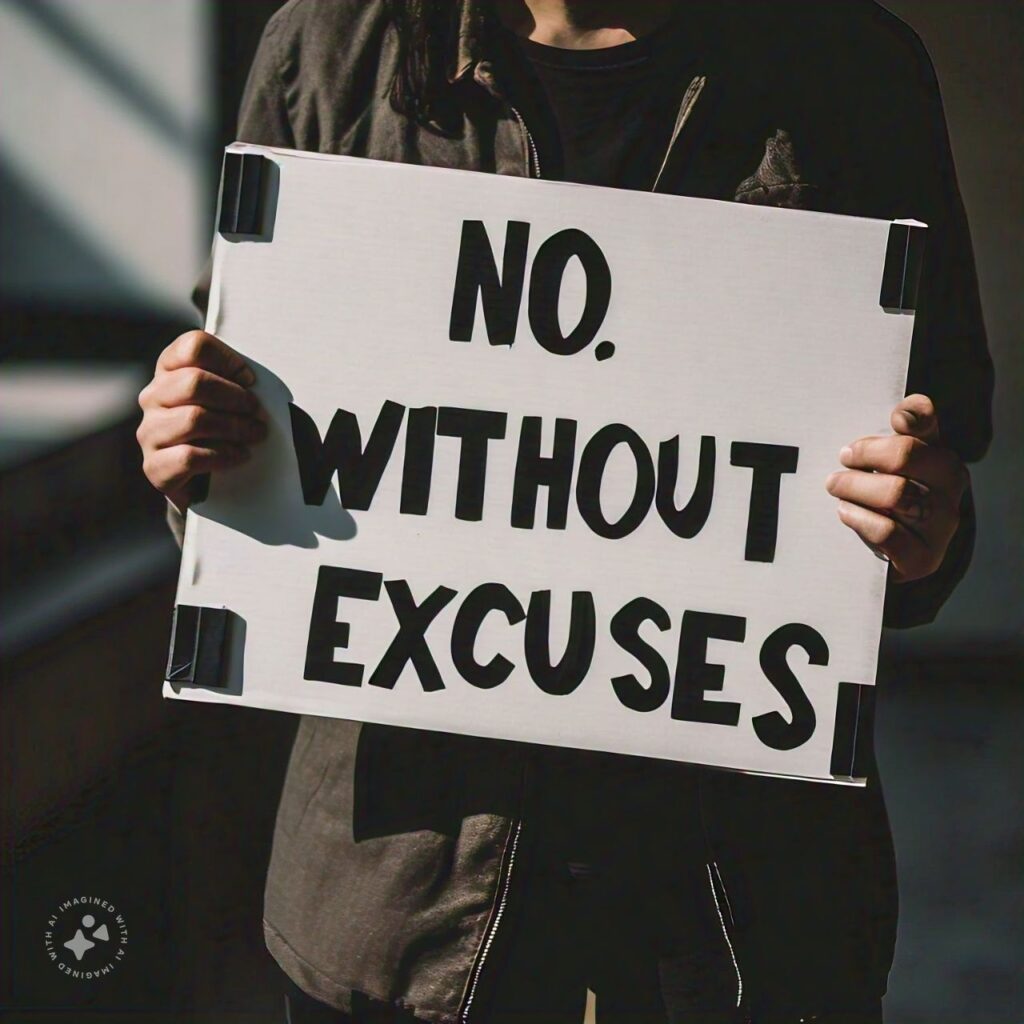Have you ever struggled to say no, even when it’s for your own good? You’re not alone. A recent study found that half of the people agreed to do tasks they didn’t agree with, like damaging a library book. This shows how much we want to fit in and avoid conflict.
Saying yes all the time can lead to overcommitting and harming your relationships. But, learning how to say no without excuses can actually make you stronger. It can boost your confidence and help you grow personally.
This article will share tips to help you say no without making excuses. Are you ready to take back your time and improve your work-life balance? Let’s get started!

Why Saying No Is So Hard
Have you ever nodded to a request, only to regret it later? You’re not alone. Most people lean towards saying yes, making it hard to say no.
The Evolutionary Perspective
Our ancestors survived by working together, valuing peace over arguments. This shows our instinct to avoid fights and fit in is why saying no is tough.
Studies at Duke University found that passionate workers often get asked to work more. This makes it harder for them to say no. Emotional smarts are key to handling these situations well.
Fear of Rejection
Many fear the emotional fallout of saying no. They worry about letting others down or facing criticism. This fear leads to stress and guilt.
Research suggests using “I don’t” instead of “I can’t” when saying no. This change shows confidence and helps with emotional stress. Learning these tips can make setting boundaries easier and reduce stress.
The Importance of Saying No
Saying no is a key way to keep your integrity and stick to what you believe in. Steve Jobs showed us that focusing on what’s really important can lead to big wins. It’s vital for managing your time well, letting you focus on what matters most to you.
Studies show that those who can’t say no often feel guilty and anxious. This can hurt their overall happiness.

Maintaining Integrity
Learning to say no helps you keep your integrity. It’s tough for people-pleasers, but it shows you’re true to your priorities. A Harvard Business Review study found that saying sorry too much is a sign of not being able to say no, leading to more stress.
Being clear and strong in your answers can boost your communication and confidence. It also stops you from feeling resentful towards others.
Enhancing Work-Life Balance
Saying no is also key to a better work-life balance. A study by the American Psychological Association showed that those good at saying no feel less stressed and more confident. This is great for your mental health and reducing anxiety.
When you manage your time well, you make space for personal projects and relaxation. This keeps your work and personal life in balance. Saying you need time to think can also help your team, making sure you’re not overwhelmed or exhausted.
How to Say No Without Excuses
There are many ways to respond to requests, like giving clear answers, being polite but firm, or adding humour. These methods help in solving conflicts, keeping emotions in check, and being clear in what you want. Here are some good ways to say no:
Simple and Direct Responses
A simple “no” can work well. Many people find it hard to say no because they feel guilty or worry about causing conflict. But being direct shows you value your time and the other person’s. For instance, you could say, “I’m not able to commit to this right now.” This way, you avoid giving long explanations and protect your feelings.
Polite But Firm Statements
For a diplomatic way of saying no, be polite but firm. You could say, “I appreciate the offer, but I have other priorities at this time.” This shows respect and sets clear boundaries. Being polite and firm helps in solving conflicts and keeps relationships strong while staying true to yourself.
Humorous Responses
Adding humour to a “no” can make it easier to hear. If someone asks you to do something extra, you might reply, “Unless I can clone myself, I’ll have to pass!” Humour can ease the tension, making the refusal less personal. It’s a clever way to be clear and keep your emotions in check. Remember, being emotionally smart is not just about what you say, but how you say it.
Tactical Ways to Delay Your Response
When you can’t answer right away, it’s key to use strategies that help with personal growth, setting limits, and managing time well. This part will show you how to wait before responding without hurting your integrity or relationships.

Ask for Time to Think
Saying no right away can be hard because you might worry about being rejected. To get past this, ask for time to think. This is a smart move for managing your time, letting you look at your commitments and decide what to do next. Saying things like, “Let me check my calendar and get back to you,” or “I need to think about other things first,” helps you buy some time.
Offer an Alternative
Offering another solution is a great way to set boundaries and grow personally. It helps you manage your time better. For instance, if you can’t take on a new project, you could say, “I can’t help you with that now, but I know someone who can.” This way, you’re seen as helpful and reliable while still keeping your own limits.
Using these strategies, you can get better at waiting before you respond, which is key to balancing your life. These methods not only help you manage your time but also build respect and understanding in your relationships. Remember, asking for time and offering alternatives are strong tools for personal growth.
Practicing Your No
Improving your ability to say no can be thrilling. It leads to more self-confidence, personal growth, and better communication skills. Remember, practice is key, just like in any skill you want to master.
Rehearse Beforehand
Think about rehearsing your responses before you’re bombarded with requests. This can lower your anxiety and boost your confidence in saying no without guilt. Many people, about 80%, find it hard to say no because they worry it might hurt relationships.
Practising can ease this fear and get you ready for real-life situations. It will make you more confident in your ability to communicate assertively.
- Mirror talk: Practice saying no in front of a mirror. It helps you see the situation better and builds your confidence.
- Record and review: Record your practice and check your tone and body language. This helps you improve your approach, making your no clear and confident.
Role-Play Scenarios
Role-playing is a great way to practice saying no safely. You can do it with a friend or family member. It prepares you for different situations and reactions you might get. This kind of practice helps you grow personally and improves your communication skills.
- Common scenarios: Try saying no to invitations, more work, or social plans. Each situation helps you develop a good way to say no in different situations.
- Feedback loop: Ask your role-play partner what they think. Getting feedback from someone else can show you what you need to work on. It helps you build a strong and confident no.
By spending time to rehearse and role-play, you’ll get better at managing your time, reducing stress, and feeling more free. Remember, getting good at saying no is a big step towards more self-confidence and personal growth.

When No Explanation Is The Best Explanation
Knowing when to say no without explaining can change the game. It shows self-confidence and helps set clear boundaries. Saying “no” confidently stops back-and-forth, keeping your decision strong without pressure to change it. It helps avoid unnecessary justifications that can distract you.
For high achievers, saying “no” without a long explanation is key to focusing on goals. Women often struggle with saying “no,” but it’s crucial for reducing stress and gaining free time. Setting boundaries boosts self-confidence and keeps you focused on what’s important.
Stick to Your Decision
After deciding to say “no,” stay firm with it. Listen well, set clear priorities, and speak up assertively. Remember, a lot of people struggle to say “no” because they want to be loved and valued. Yet, a simple “no” in one or two sentences is often enough, to keep your confidence and integrity intact.
When you say “no” to something minor, you’re really saying “yes” to your main goals and priorities. This approach improves your focus, sleep, and even your exercise habits. Every “no” is a step towards a balanced, stress-free life.
In the End…
Learning to say no without excuses is key for your personal growth and setting boundaries. This article showed why it’s tough to say no and how societal norms and fear of rejection affect us. From a young age, you’re taught that saying no is rude, making it hard as an adult.
Saying no is crucial for a better work-life balance and well-being. Saying yes when you mean no can lead to doubt and stress. Being direct and not apologizing too much helps you say no confidently. Remember, your self-worth isn’t based on always doing what others want.
With the right strategies and practice, you can make choices that fit your goals. Knowing when to say no helps you live a balanced, fulfilling life. So, use your assertive communication skills and set boundaries to protect your time and energy.
If you enjoyed this blog post you might also like our blog post on 7 Reasons To Say No To Sleepovers: An Expert Guide



1 comment
[…] also have a blog post on How To Say No Without Excuses: An Expert Guide. If you enjoyed this blog post, you might as well enjoy […]
Comments are closed.